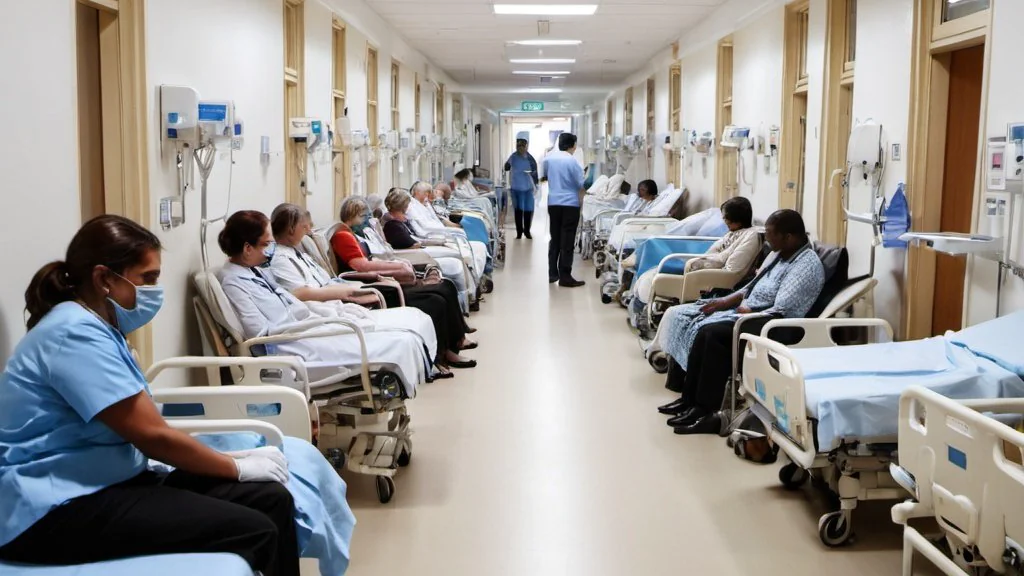Articles & News
- Home
- Blog
20. Marzo 2024
EU-Policy
Wealth Inequality drives Health Inequality: An analysis of primary care services in the UK

Access to primary care is crucial for good health. While Integrated Care Boards (ICB) receive funding equal to their delivery size the health needs of some areas are higher than others. Communities experiencing economic hardship need more funding to deal with their more complex health needs. Primary care is already facing a funding crisis as local practices struggle to keep up with current demand.
The government attempted to address this problem in 2019 with the Primary Care Funding (PCN) scheme. PCNs provide evenly distributed funding for up to 26,000 new support staff, but not nurses or GPs, for primary care. This universalist approach already disadvantages less fortunate areas by evenly spreading funding. Concerningly, a 2023 report by the Health Foundation found that ‘PCNs in areas of high deprivation have access to less funding and fewer staff than those in areas of low deprivation.’ These health authorities struggle to hire and retain new staff and the funding goes away if not spent. The current government PCN program is not working to address regional inequality.
How Inequality Leads to Poor Health
Income inequality leads to a decrease in personal health. Experiencing unsafe or inconsistent housing creates an environment where people are exposed to harmful substances or regularly rough sleeping. Simply having a permanent place of residence is not enough: poor housing conditions and exposure to damp can lead to respiratory issues and asthma. Similarly, possessing a low-quality job can be as harmful as not having one at all. Exposure to workplace hazards, poor mental health, shift-work, and high stress all lead to worsening health conditions. Proper mental health support can be hard to provide for a transient or overworked patient. Someone scraping by in a poor living situation has both higher healthcare needs and requires more flexibility from the healthcare system.
Ethnic minorities in particular face issues from the healthcare system. Immigrants feel that they receive lower quality service from both language barriers and potential racial stereotypes from healthcare workers. Poor past experiences can cause people to not trust the system and show reluctance to seek medical help when they need it. Often, ethnic minorities live in more economically deprived areas. To bridge this gap, ICBs need to invest in better outreach, language options, and general cultural awareness. However, they lack the funds and struggle to provide adequate primary care for their region.
Impact on Healthcare Delivery
The increased demand caused by poor health is shouldered by local ICBs. Health authorities in deprived areas need to invest more in primary care to the detriment of other critical areas. Hospice UK found that adult spending differs by £10.33 to £0.23, and for children it varies by £511 to £28 by ICB. Despite significant mental health challenges, deprived authorities only hire 1.41 mental health workers per 100,000 people, compared to hiring 10.73 pharmacists. Poor health conditions drive authorities to invest in primary care to the detriment of other essential areas.
Ultimately, the people that need support the most are not able to receive it. When faced with increasing pressure and demand for primary care, ICBs naturally prioritize it to the detriment of other aspects of healthcare delivery. Under-funded health authorities struggle to keep up with the burden of modern healthcare demands, which is only compounded by a lack of funding. When they do receive funds, it is used to supplement existing primary care systems.
Prospective Solutions
Several groups have offered solutions to try to address regional inequalities. The Institute for Public Policy Research suggests the development of new, regional health zones capable of raising local taxes and setting their own regional goals. That said, PCNs are already administratively layered over ICBs, and adding another layer may lead to less efficiency and more competing interests. The Health Foundation suggests changing PCN distribution to better advantage impoverished areas. The Labour Party NHS plan recognizes regional inequalities in health delivery but does not propose increased funding for ICBs nor any concrete solutions. While the acknowledgement is helpful, it is paramount that political parties work to create programs specifically targeted at economically disadvantaged areas.
Any attempt to remedy inequality cannot rely on cash transfers to ICBs but must instead invest in the right areas to improve delivery. PCNs can enhance cancer and complex case treatment; however, without any direction beyond hiring support staff, health authorities prioritize primary care. Economically deprived regions need both extra support for GPs and for specialist care to better service their community. Either PCN reform or a new program dedicated specifically to impoverished IBCs must be brought in to help those that need it most.
Author:
Sean
Stinson
Recenti Pubblicazioni
-
 15 Lug 2024Navigating Discontent: Greek Parties Reframe European Election Results
15 Lug 2024Navigating Discontent: Greek Parties Reframe European Election Results -
 26 Giu 2024Shaping the Ballot: The Influence of National Issues on Spain's European Election Results
26 Giu 2024Shaping the Ballot: The Influence of National Issues on Spain's European Election Results -
 21 Mag 2024Local Elections in England: an impending change of direction in UK health policy?
21 Mag 2024Local Elections in England: an impending change of direction in UK health policy? -
 25 Apr 2024Navigating Slovakia's Political Maze: Disinformation, Power Plays, and the Road Ahead
25 Apr 2024Navigating Slovakia's Political Maze: Disinformation, Power Plays, and the Road Ahead -
 10 Apr 2024Navigating Digitalisation - Challenges and Progress in German Healthcare
10 Apr 2024Navigating Digitalisation - Challenges and Progress in German Healthcare
